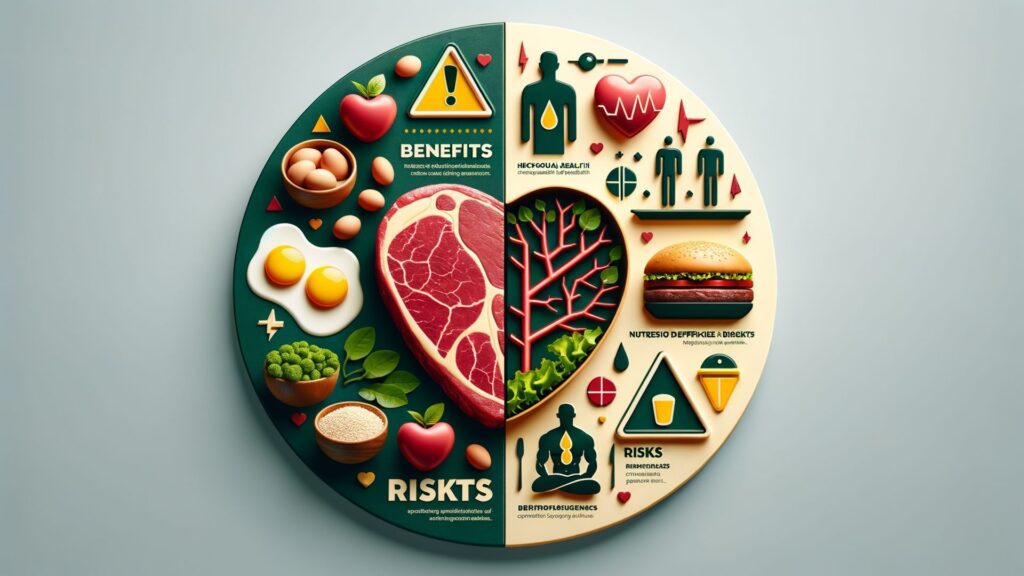What Doctors Are Saying About the Carnivore Diet
The carnivore diet, an eating pattern that exclusively focuses on animal products, has garnered significant attention in recent years. Advocates claim various health benefits, while health professionals raise concerns about its long-term safety and nutritional adequacy. In this article, we will explore what experts say about the benefits and risks of the carnivore diet, how to structure a meal plan, and whether this restrictive diet is suitable for everyone.

What Are the Benefits and Risks of
the Carnivore Diet?
What Experts Say About the Risks of the Carnivore Diet?
Experts caution that the carnivore diet may pose several health risks. The most notable concern is its restrictive nature, which eliminates essential food groups such as fruits, vegetables, and whole grains. According to registered dietitian nutritionists, this lack of variety could lead to deficiencies in vital nutrients, including vitamins, minerals, and dietary fiber. Furthermore, the diet’s high intake of saturated fat may increase the risk of heart disease and elevate cholesterol levels. Experts also warn that the absence of plant-based foods can adversely affect gut health, as a lack of fiber can lead to digestive issues. Shawn Baker, a prominent advocate of the carnivore diet, emphasizes the benefits of high-fat animal products; however, nutritionists argue that the long-term effects of such a diet remain largely unknown.

Are There Any Notable Benefits of an All-Meat Diet?
Despite the risks, some proponents of the carnivore diet assert that it can lead to notable benefits. Many individuals report weight loss, improved energy levels, and enhanced mental clarity after adopting this eating pattern. The elimination of carbohydrates may stabilize blood sugar levels, which could be particularly beneficial for those managing type 2 diabetes. Additionally, some studies suggest that certain individuals may experience reduced inflammation and improved symptoms of autoimmune conditions when following an all-meat diet. However, experts remain skeptical and advise that these benefits are anecdotal and may not apply universally. It is essential for individuals considering this diet to consult with healthcare professionals to understand the potential implications for their health.
What Nutritionists Recommend Regarding the Carnivore Diet?
Nutritionists recommend a cautious approach when it comes to the carnivore diet. Many emphasize the importance of a balanced diet that includes a variety of food groups. They suggest that while animal products can be a part of a healthy eating pattern, they should not be the sole focus. A well-rounded diet that incorporates fruits, vegetables, whole grains, and lean proteins is essential for long-term health. Registered dietitians also advise individuals to be mindful of their overall nutrient intake and to consider the potential risks associated with a high-saturated fat diet. Moreover, they highlight the importance of individualized dietary plans, as what works for one person may not be suitable for another.
What Should a Carnivore Diet Meal Plan Include?
What to Eat on the Carnivore Diet?
The carnivore diet is characterized by its exclusive focus on animal-based foods. Individuals following this diet typically consume a variety of meats, including beef, pork, lamb, and poultry. Additionally, fish and seafood can be included, as well as animal-derived products such as eggs and dairy. It is essential for those on the carnivore diet to prioritize high-quality sources of protein and fat. Foods high in saturated fat, such as fatty cuts of meat and certain dairy products, can be staples in this eating pattern. However, it is crucial to note that the absence of plant-based foods can lead to a lack of dietary fiber, which is vital for digestive health.
How to Create a Simple Carnivore Diet Meal Plan?
Creating a simple carnivore diet meal plan involves selecting a variety of animal products to ensure adequate nutrient intake. A basic meal plan might include breakfast options such as scrambled eggs cooked in butter, followed by a lunch featuring grilled steak or chicken thighs. For dinner, individuals might opt for roasted pork belly or a hearty lamb chop. Snacks can consist of beef jerky or hard-boiled eggs. While the carnivore diet simplifies meal preparation by eliminating the need for complex recipes and ingredients, it is essential to vary the types of meats consumed to prevent monotony and enhance nutrient diversity. Consulting with a registered dietitian can help tailor this meal plan to individual health needs.
Sample Carnivore Diet Meal Plan for Beginners
For those new to the carnivore diet, a sample meal plan can provide guidance on how to navigate this eating pattern effectively. A beginner’s carnivore diet meal plan might look like this: for breakfast, two eggs fried in bacon grease, paired with slices of bacon; for lunch, a grilled ribeye steak seasoned with salt; and for dinner, a baked salmon fillet with a side of bone broth. It is advisable to drink plenty of water throughout the day to stay hydrated. This meal plan highlights the simplicity of the carnivore diet while ensuring that individuals consume a range of animal products. As with any diet, it is crucial to listen to one’s body and adjust food choices based on personal health responses.
Is the Carnivore Diet Safe for Everyone?
What Are the Health Risks Associated with the Carnivore Diet?
The safety of the carnivore diet remains a contentious issue among healthcare professionals. Potential health risks include nutrient deficiencies, as the diet is devoid of essential vitamins and minerals typically found in plant-based foods. Research indicates that a prolonged lack of dietary fiber can lead to constipation and other gastrointestinal issues. Moreover, the high saturated fat content of the diet may increase the risk of heart disease and elevate cholesterol levels, particularly in individuals with pre-existing health conditions. Experts recommend that anyone considering this restrictive eating pattern should undergo a thorough health assessment to evaluate their suitability for the diet.
Who Should Avoid the Carnivore Diet?
Certain populations should exercise caution or avoid the carnivore diet altogether. Individuals with pre-existing health conditions, particularly those related to heart disease, diabetes, or kidney issues, may experience adverse effects from this type of eating pattern. Pregnant and breastfeeding women, as well as children and adolescents, should also avoid restrictive diets that limit essential food groups. Furthermore, individuals who have a history of eating disorders or those who may be susceptible to disordered eating patterns should consider seeking professional guidance before attempting the carnivore diet.
How Does the Carnivore Diet Compare to Other Diets?
When comparing the carnivore diet to other dietary approaches, such as the ketogenic diet, significant differences emerge. The ketogenic diet allows for a broader range of food groups, including low-carb vegetables and dairy, while the carnivore diet strictly limits intake to animal products. As a result, the ketogenic diet is often viewed as more sustainable and nutritionally balanced. Additionally, many experts believe that the carnivore diet may share similarities with fad diets that promote extreme restrictions, which can lead to unhealthy eating behaviors. Ultimately, individuals should be cautious when opting for highly restrictive diets and consider the long-term implications for their health.
What Do Experts Say About the Carnivore Diet’s Nutritional Value?
Is the Carnivore Diet Lacking in Essential Nutrients?
Experts consistently express concerns regarding the carnivore diet’s nutritional value. Many agree that the diet is lacking in essential nutrients, particularly those that are abundant in plant-based foods. Vitamins such as vitamin C, which plays a vital role in immune function, and various phytonutrients found in fruits and vegetables, are absent in this eating pattern. Furthermore, the lack of dietary fiber is a significant drawback, as it is crucial for digestive health and preventing chronic diseases. While animal products are rich in certain nutrients, the narrow focus of the carnivore diet raises questions about its ability to meet all nutritional needs over time.

How Does a Meat-Based Diet Affect Heart Health?
The impact of a meat-based diet on heart health is a critical area of concern among experts. High consumption of red meat and saturated fat has been linked to an increased risk of heart disease. While some studies suggest that individuals may tolerate high-fat diets without adverse effects, others indicate that a consistent intake of saturated fats can lead to elevated cholesterol levels and associated cardiovascular issues. Experts recommend a balanced approach that includes a variety of food groups to support heart health and reduce the risk of chronic diseases.
Can the Carnivore Diet Lead to High Cholesterol Levels?
There is considerable debate about whether the carnivore diet can lead to high cholesterol levels. Some individuals following the diet report favorable cholesterol profiles, while others experience significant increases in their cholesterol levels. The variation in responses may be attributed to individual differences in metabolism and genetics. However, most healthcare professionals caution against the potential for elevated cholesterol levels and recommend regular monitoring for those who choose to follow this restrictive diet. It is essential to weigh the potential benefits against the risks when considering the carnivore diet.
Doctors Are Saying About The Carnivore Diet Frequently Asked Questions:
Q: What is the carnivore diet, and what are its main principles?
A: The carnivore diet is a dietary approach that involves consuming primarily animal products, such as meat, fish, and animal-derived foods, while excluding all plant-based foods. Proponents of this diet claim that it can lead to weight loss and improved health, but medical advice often cautions against its restrictive nature.
Q: What are the potential health risks associated with the carnivore diet?
A: Medical professionals warn that the carnivore diet is lacking in essential nutrients found in fruits, vegetables, and grains. There are concerns that this restrictive diet may increase the risk for heart disease and other conditions due to its high-protein content and lack of dietary fiber.
Q: How does the carnivore diet compare to the keto diet?
A: Both the carnivore diet and the keto diet are low carb diets that emphasize high protein and fat intake. However, the keto diet allows for a wider variety of foods, including some non-starchy vegetables, while the carnivore diet strictly limits intake to animal products only.
Q: Are there any benefits to trying the carnivore diet?
A: Some individuals report weight loss and improved energy levels while trying the carnivore diet. However, these claims should be approached with caution, as they may not apply to everyone, and the diet isn’t suitable for long-term adherence due to its restrictive nature.
Q: Is the carnivore diet suitable for everyone?
A: No, the carnivore diet is not suitable for everyone. Individuals with specific health conditions, dietary needs, or those who require a balanced diet may find this approach detrimental. It is important to consult a healthcare professional before making significant dietary changes.
Q: What do experts say in their carnivore diet reviews?
A: Experts in carnivore diet reviews often highlight the diet’s potential risks, such as nutrient deficiencies and the impact on long-term health. They emphasize the importance of a balanced diet that includes a variety of food groups for optimal nutrition.
Q: Can the carnivore diet lead to weight loss?
A: While some individuals may experience weight loss when following the carnivore diet, it is crucial to note that this may not be sustainable or healthy in the long term. Weight loss results can vary significantly based on individual metabolism and lifestyle factors.
Q: What are some foods that aren’t allowed on the carnivore diet?
A: The carnivore diet excludes all plant-based foods, including fruits, vegetables, grains, legumes, nuts, and seeds. This strict elimination diet can make it challenging to meet overall nutritional needs.
Q: Are there any alternatives to the carnivore diet?
A: Yes, alternatives such as the paleo diet or a balanced low carb diet may provide similar benefits without the extreme restrictions of the carnivore diet. These diets allow for a wider variety of foods, promoting a more nutritious and sustainable way of eating.
Q: What should someone consider before trying the carnivore diet?
A: Before trying the carnivore diet, individuals should consider their overall health, any pre-existing conditions, and consult a healthcare provider. It is essential to evaluate whether this highly restrictive approach aligns with personal health goals and dietary needs.




